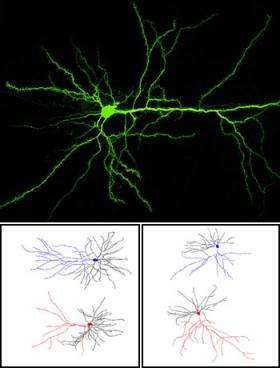Chronic stress affects attention by altering neuronal growth in the brain

Anxiety and depression can make a person feel as if he’s battling his own brain, complete with wounds and scars. Traumatic events — war, divorce, the death of a loved one — can trigger these disorders, and scientists are just beginning to clarify the biological connection. Now, working neuron by neuron, researchers have found that life experiences actually appear to change the length and complexity of individual brain cells.
In a recent study published in The Journal of Neuroscience, Rockefeller University scientists show that chronic daily stress affected neurons in two different areas of the rat brain, showing for the first time a link between anxiety symptoms and the dynamic anatomy of the brain.
One of the characteristic manifestations of prolonged stress is decreased performance in tasks that require attention, including the ability to shift focus as well as to learn and unlearn information. Bruce McEwen, Rockefeller’s Alfred E. Mirsky Professor and head of the Harold and Margaret Milliken Hatch Laboratory of Neuroendocrinology, was interested in finding out how this translates to changes in the brain itself. So he and Conor Liston, a graduate student in McEwen’s lab, compared neuronal change in stressed and unstressed rats.
The researchers stressed out a dozen rats by keeping them in painless restraints for six hours a day. Then, after 21 days, they used a complex progression of trials to test how quickly the rats learned to make associations between different cues and the location of hidden food. First, Liston provided two different materials for the rats to dig in, such as sand and sawdust, and buried food consistently under only one. Next, he left the food in the same material but scented it with strong spices (like cumin or nutmeg) that were unrelated to the food’s location. Then he buried the food according to scent, teaching the rats to use odor as the location cue — in other words, it could be buried in either sawdust or sand, as long as it smelled like cumin. Finally, Liston flip-flopped the scent cues, so that the rats had to unlearn the prior scent association and remember a new one.
The stressed rats performed as well as the unstressed ones in all but the last task: It took them significantly more time to catch on to a new pattern. With the collaboration of John Morrison, a neuroscientist at the Mount Sinai School of Medicine, the researchers looked at neurons in two parts of the rats’ brains — the medial prefrontal cortex (mPFC) and the orbital frontal cortex (OFC) — and saw a correlation. The prefrontal cortex is typically involved in working memory: paying attention to one thing at the expense of another, and shifting that attention from one focus to another. And sure enough, neurons in the stressed rats’ mPFC were shorter and had less branching or “arborization” than those in the control rats. Prior experiments had shown that lesions in this area of the brain could cause this effect. “But it was remarkable that stress produced almost as large a deficit in attention-shifting tasks as lesions,” McEwen says. “I think this is the most profound negative effect of stress on a brain measure that I have seen.”
The OFC, on the other hand, is involved more in what scientists call reward processing: modifying behavior to get the most reward possible from the surrounding environs. What McEwen and Liston found when they looked at OFC neurons surprised them: Rather than shrinking, neurons in the stressed rats’ OFC were longer and more branched than those of the control rats. Which, Liston says, certainly raises some questions. “You’d expect that if atrophy of arbors impairs performance, proliferation would enhance performance.” Although the results seemed to lean in that direction — with the stressed rats a bit quicker to learn that the food had been buried in the previously unimportant digging material — the tests weren’t sensitive enough to pick up appreciable differences and McEwen and Liston are now working to figure out how to test for and tease out this disparity.
The more information researchers have about how stress impacts these areas of the brain, the better equipped they’ll be to develop ways to help people with drug addictions, depression and anxiety disorders, among others. “There’s a lot of discussion about how behavioral cognitive manipulation might be able to help people handle post traumatic stress disorder and obsessive compulsive disorder,” McEwen says, “and ways in which the disorders can be unlearned or extinguished.”
Source: Rockefeller University





















